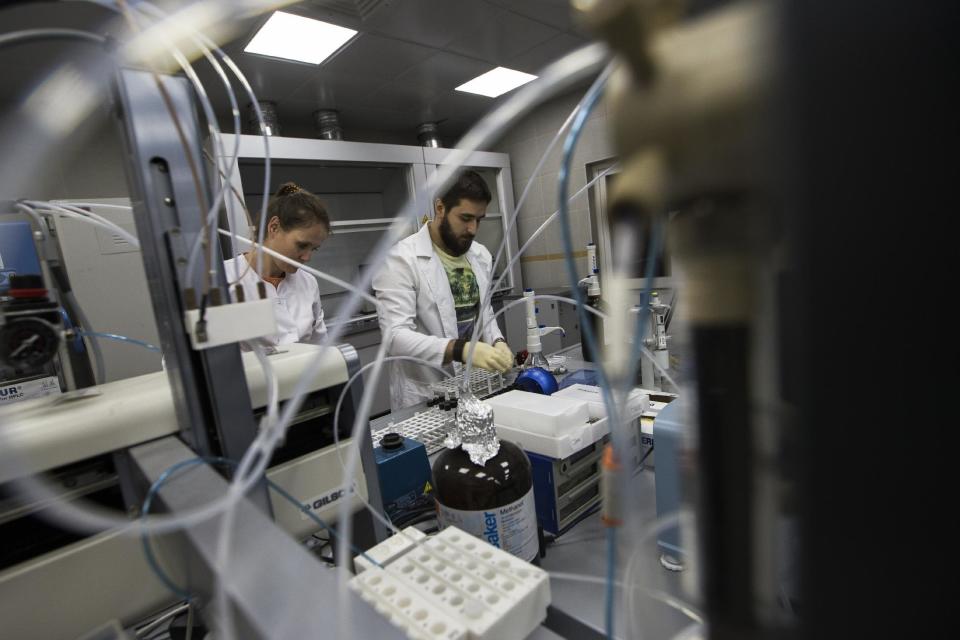Column: Time to make Russians pay for Olympic doping
There are really only two possible explanations why two members of the Russian women's hockey team at the Sochi Olympics had urine samples that contained male DNA.
One, there were men inside those baggy uniforms of a team that won its first three games before losing in the quarterfinals. Two, someone was messing with the samples.
It's a bit easier to figure out why eight other Russian athlete samples in Sochi had salt content that was physiologically impossible in a healthy human.
Simply put, the host country was cheating on a level never before seen in organized sports.
That news is not exactly new, of course. Doping investigators first nailed the Russians for covering up and tampering with drug tests in July in a report that should have gotten them kicked out of the Rio Olympics.
It didn't, because the International Olympic Committee bowed to Vladimir Putin and allowed individual sports federations to decide which Russians could compete. A lot of them did, and Olympic officials were exposed as the hypocrites they are when it comes to ridding sports of cheaters.
Putin and his minions basically dismissed the first McLaren report commissioned by the World Anti-Doping Agency as unfounded and full of lies. Putin himself claimed Russian track and field athletes were being discriminated against.
And just last month, the former Soviet minister brought out of retirement by Putin to lead Russia's future strategy on doping declared that there was no state-sanctioned program to help Russian athletes win medals.
"There was no organized doping system on the state level," Vitaly Smirnov said. "We believe that the participants in this were individuals, who were pursuing their own goals."
The release Friday of the second McLaren report says otherwise, and is backed with a ton of evidence. Any Russian denials will ring hollow, even to the ears of previously tone-deaf Olympic leaders.
In voluminous detail, Canadian lawyer Richard McLaren documented how more than 1,000 Russian athletes were involved in the doping scheme. The report unveiled a vast "institutional conspiracy" in more than 30 sports along with the corruption of the drug-testing system at the 2012 and 2014 Olympics.
Russians cheated like crazy in London, with 15 medal winners part of the deception. They took it to a new level at home in Sochi, where Vladimir Putin led the cheerleading as juiced Russian athletes led their country to the top spot on the medal table.
The cheating even included tampering with the urine samples of six Russian athletes who won a total of 21 medals at the Sochi Paralympics.
"For years, international sports competitions have unknowingly been hijacked by the Russians," McLaren said.
Indeed they have. Now the question is, what will Olympic officials and leaders of sports around the world do about it?
The release of the first report got some Russians banned from Rio, though the IOC at the last minute rejected WADA's request to ban the entire team. Russians are also being systematically stripped of their medals from both London and Sochi.
But that's hardly punishment enough for a cheating conspiracy that seemed to begin after Russia was embarrassed by an 11th-place showing in the medal standings at the 2010 Winter Olympics in Vancouver. It involved top officials in the Russian Sports ministry, FSB intelligence service and the country's anti-doping agency.
IOC President Thomas Bach, who resisted efforts to ban Russia from Rio, finally seems to get it. He said Friday that any athlete or official involved "in such as sophisticated manipulation system" should be banned for life from the Olympics.
Again, though, not enough.
The McLaren report shows a scam carried out by agencies among the highest levels of Russian government. The punishment should hit the highest level of Russian government.
A good start would be a complete ban on Russia at the 2018 Games in Pyeongchang, South Korea. This should be a no brainer, with just 14 months left before the games and the Russians still in denial.
Next, Olympic officials should immediately push to move the bobsled and skeleton world championships set for Sochi in February. American bobsled and skeleton athletes were already discussing a possible boycott of the championships to protest the doping scandal.
Third, Russia should be put on Olympic probation, where anything other than strict compliance will mean a ban of Russia for the Tokyo Olympics in 2020.
Lastly, there needs to be an Olympic housecleaning. Bach and other Olympic officials who caved in to Russia in Rio should be replaced with new leaders who show a greater commitment to clean sports.
The ball was fumbled in July when Olympic leaders could have made an emphatic statement about clean sports and level playing fields.
It's time to make sure it doesn't happen again.
____
Tim Dahlberg is a national sports columnist for The Associated Press. Write to him at tdahlberg@ap.org or http://twitter.com/timdahlberg










